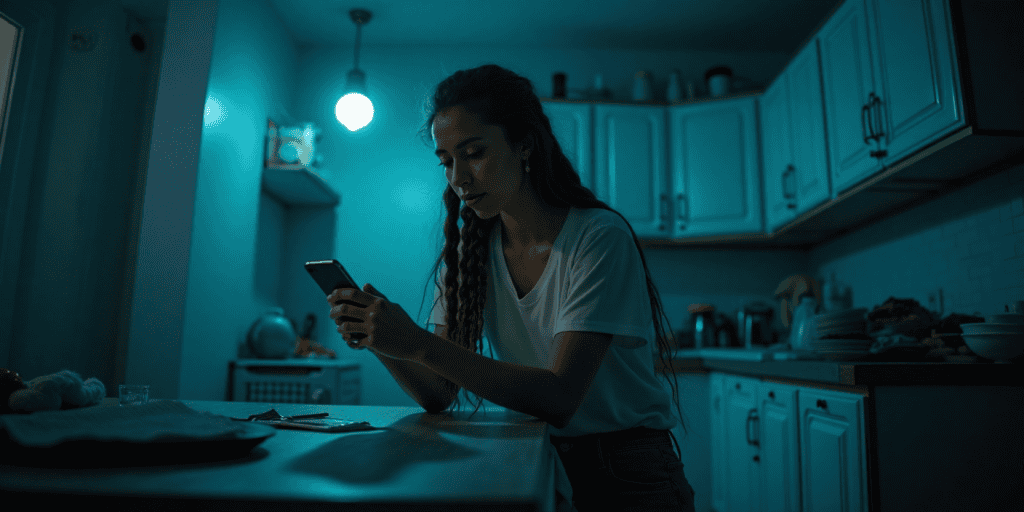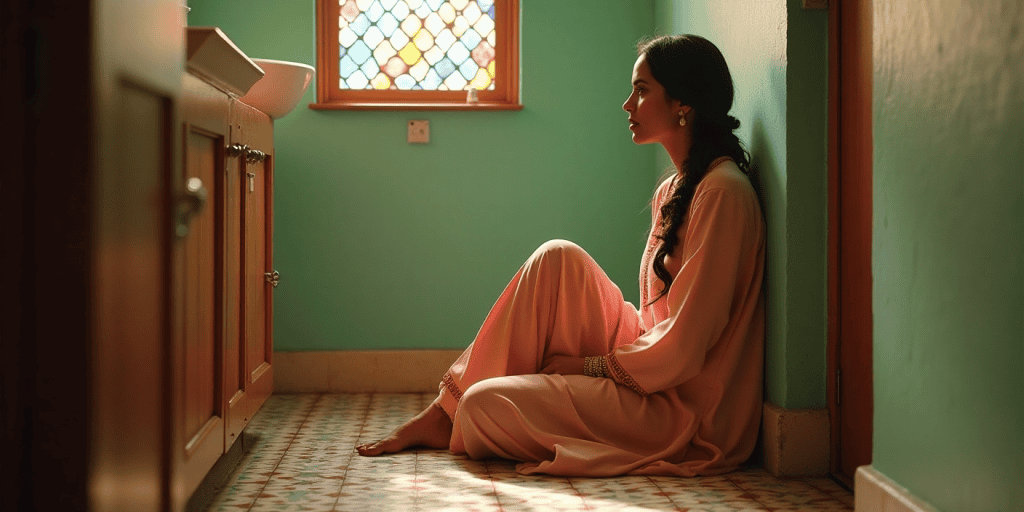Ever found yourself begging for closure from someone who broke you, only to be met with silence, blame, or worse, a blank stare?
I remember sitting on the edge of my bed, clutching my phone like it was a lifeline.
I had just sent my narcissistic older sister another message, one final attempt to get her to acknowledge what she did.
To say something. Anything. But all I got back was silence.
No apology. No explanation. Just the same emotional void I had been trying to climb out of for months.
And that’s when it hit me: Closure wasn’t coming.
Not because I didn’t deserve it, but because she was never capable of giving it. Accountability is not what narcissists do.
If you’ve been stuck in that same limbo, waiting, hurting, wondering, you’re not alone.
I’ve been there, and I want to share with you how I found peace anyway. Not through them. But through me.
Table of Contents
The Truth About Closure And Why You’ll Probably Never Get It?

For the longest time, I believed closure was a conversation.
One last heart-to-heart where my narcissistic family would finally admit what they did, show remorse, and maybe even apologize.
I needed that apology like air. I thought I couldn’t move forward without it.
So I waited. I gave them space. I sent polite messages. I tried not to sound angry. I tried to “be the bigger person.”
What I didn’t know then, and what I had to learn the hard way, is that narcissists don’t give closure.
They don’t validate your pain because that would require them to see you as a real person, not a reflection of their ego.
The silence wasn’t just avoidance. It was power. It was punishment. And it was intentional.
I’m not the only one who felt this way. Research backs it up.
A 2024 study highlights how victims often experience deep psychological wounds that linger long after the relationship ends.
These scars are real, measurable, and often misunderstood, and the lack of closure only makes recovery harder.
I remember one night, after weeks of no contact, I reached out again, one final attempt.
I poured my heart out in a message I’ll never forget. And what did I get back? A thumbs-up emoji. That was the moment it clicked.
Closure was never coming. And chasing it was destroying what little was left of me.
What finally set me free wasn’t anything they did. It was a truth I whispered to myself through tears:
“You don’t need their acknowledgment to heal. You need your own permission.”
Rock Bottom Wasn’t Pretty, But It Was What I Needed!

I wish I could say I left with my head held high and never looked back. But the truth is, I broke before I began to heal.
There were mornings I couldn’t get out of bed. My chest felt like it was caving in, and anxiety gripped me like a vice. I lost weight.
I lost family members who didn’t agree with the decision to cut off my toxic family. I lost the version of me that once believed love meant loyalty at any cost.
One night, I had a full-blown panic attack in front of my husband and son. It felt like the universe was mocking me. I went upstairs and cried.
But here’s the thing: rock bottom is strangely honest. There’s no pretending. No performance.
Just you, raw and undone, realizing that no one’s coming to fix this, and that’s where the real healing begins.
I remember looking in the mirror one morning, red-eyed and empty, and saying out loud: “This isn’t about them anymore. This is about me now.”
And that was the moment I stopped surviving and started rebuilding.
How I Rebuilt My Life After Narcissistic Abuse (Step-by-Step)?

This didn’t happen overnight. Healing was a slow return to myself, marked by tiny, powerful moments. And it didn’t require an apology. Just intention.
Step 1: I Stopped Explaining My Pain to People Who Didn’t Deserve It
In the beginning, I over-explained. I wanted people to understand why I was so broken, so angry, so lost. I wanted validation. I needed someone to say,
“Yes, what happened to you was real.”
But what I learned is that some people don’t have the emotional bandwidth to meet you where you are, and others just don’t want to.
Every time I told the story, it was like reopening a wound. Some people offered empathy.
Others responded with, “Well, maybe they didn’t mean it like that.” And that hurt more than staying silent.
Eventually, I stopped explaining my pain. I started saying, “I’m not available for this conversation.” I protected my story. I gave myself the closure I was begging others for.
And in that silence, I found clarity.
Step 2: I Rebuilt My Identity Without Their Voices in My Head
When someone chips away at you long enough, you start mistaking their voice for your own.
I couldn’t make a decision without wondering what they’d say. Would they approve? Would they mock me? Would I still be “too much”?
I had to unlearn the version of myself that was molded by criticism, gaslighting, and control.
So I journaled. Every single day. I asked myself hard questions:
- What do I like?
- What do I believe about love now?
- What kind of life do I want, without editing it for someone else’s comfort?
One of the most powerful things I did was make small, solo decisions, what I wore, what I ate, where I went, just to prove to myself that I could trust myself again.
It wasn’t loud. It wasn’t glamorous. But it was mine.
Step 3: I Made Peace With the Past Without Needing an Apology

For a long time, I believed healing required justice. That if I could just prove they were wrong, I could be free.
But what I came to understand is that peace and justice aren’t the same thing, and one doesn’t depend on the other.
So I created my own peace. Sometimes through rituals like writing unsent letters.
Sometimes by lighting a candle and just letting myself grieve. Other times, by doing absolutely nothing and letting the silence speak.
I reframed the story. Instead of thinking, “Why did they do this to me?” I started asking, “Why did I stay, and what can I do differently next time?”
That shift, from victimhood to ownership, was everything.
Step 4: I Created a Life That No Longer Revolves Around My Trauma
The final step wasn’t about forgetting. It was about expansion.
I started rebuilding from the outside in, setting up a morning routine, decorating my space in ways that felt like me, exercising not to change my body, but to come home to it.
I stopped surrounding myself with people who needed the full backstory to believe me.
I sought out friendships that felt warm, easy, and drama-free. People who laughed with me, not at me.
And slowly, I gave myself permission to be happy, even when the trauma still lingered.
Even when I had flashbacks. Even when guilt whispered, “You don’t deserve this yet.”
I chose joy anyway.
Things I Still Struggle With (Because I’m Not a Robot)

Healing has changed my life, but it hasn’t made me invincible.
I still have hard days, just different ones now. Here’s what that looks like for me:
- Self-doubt: I still catch myself second-guessing my feelings, especially when old patterns resurface. But now I know to pause and ask, “Is this me, or a voice they left behind?”
- Triggers: Certain tones, silences, or even random moments can still take me back. My body remembers. But I don’t shame myself for it anymore. I ground myself and ride the wave.
- Grief that hits out of nowhere: It’s not about missing them. It’s missing the version of me before the damage. That grief still visits sometimes, and when it does, I let it pass through, without guilt.
But here’s the part I hold onto:
I have tools now… not just trauma. I have boundaries. I have a voice. I have people who see me clearly.
And most importantly, I have me, not the broken version, but the one I fought to rebuild.
The one who knows that healing doesn’t mean never hurting again.
It means knowing you’re strong enough to handle it when you do.
Quick Recap & Key Takeaway
- Closure isn’t something they give you. It’s something you create by refusing to let them define you anymore.
- You don’t need their apology to rebuild. You need your own permission to begin.
- You’re allowed to grieve what happened and still move forward; joy and grief can coexist.
- Healing won’t make you perfect, but it will make you powerful.
- You’re not behind. You’re just writing a new story without their voice in it, and that’s the bravest thing you’ll ever do.
So if you take anything from my story, let it be this: You don’t have to wait for them to make things right.
You don’t have to stay broken just because they never said sorry. You can heal anyway.
Take it one breath, one boundary, one “no” at a time. And on the days it feels impossible, remember… you’re not alone.
This isn’t where your story ends. This is where you begin.
You Deserve to Heal Without Their Permission
If you’ve been waiting for closure that may never come, I get it. I lived it.
And I want you to know this: you don’t need their apology to rebuild your life. You just need one decision to stop waiting and start choosing yourself.
That’s exactly what The Next Chapter is here to help you do.
Inside, I’ll walk you through the same step-by-step process I used to let go of guilt, stop replaying old stories, and finally build a life that feels safe, free, and mine.
You’ve carried their silence long enough.
Let this be the moment you give yourself what they never could: peace, clarity, and the power to move forward.
Because this isn’t where it ends. This is where you begin.
Related Posts:
- 10 Promises I’m Making to Myself After Cutting Off Narcissists
- This Is Why Waiting for Closure from Your Narcissistic Family Hurts So Much!
- How To Stay Consistent In Your Healing After Narcissistic Abuse
- 6 Phrases All Narcissistic Abuse Survivors Must Hear [What No One Tells You]
- 20 Phrases I Wish I’d Heard Sooner After Dealing With a Narcissist




